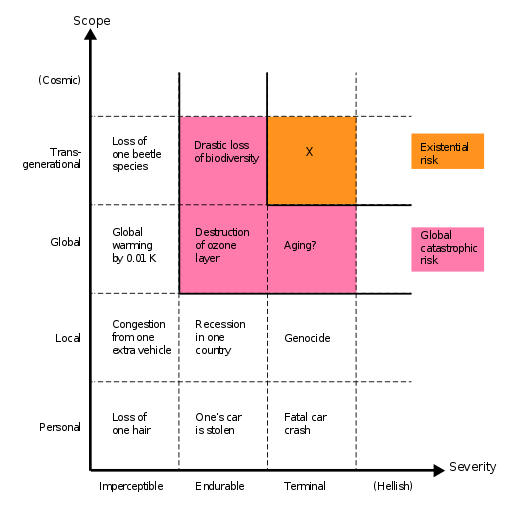The Great Filter and Utilitarian ethics: Why the only moral option is press-ganging humanity into building space ships.
To the space ship mines with you, wretch!
Aight, check it, thesis time:
Utilitarian ethics dictate that if there is even an infinitesimal chance of developing humanity to a point where a single cosmic event can’t cause extinction, then all life before that point is worthless in comparison to infinite potential cosmic welfare.
Arguments For
Here are my main arguments:
There exist extinction events; single-event existential threats to our entire species.
We have no reason to believe species-size existential threats outside of extinction events exist in the Universe.
Given enough time, it is inevitable that an extinction event will occur.
If humanity can spread outside of the range of single-event extinction, extinction becomes so improbable that it is a negligible outcome.
If extinction is negligible, then the expansion potential of humanity is infinite.
Utilitarian ethics dictate that we maximize welfare.
The potential for welfare of future lives has weight, even when discounted by probability of birth.
The limit of the welfare value of potential future life as it approaches infinity is infinity.
The potential welfare value of all current life is finite.
The relative welfare value of any current action is negligible in comparison to infinite potential future good.
Therefore only action towards an eventual infinite population is moral.
Details
Why do we have to enslave everyone?
Since it’s impossible to know when an extinction event will occur, humanity must escape the extinction horizon as soon as possible. In order to maximize our chances of escape, it must become the focus of our entire species’ productive capacity. Not everyone is going to want to go toil in the space ship mines. In order to truly maximize welfare, all must toil in the mines.
In fact, it’s immoral to let other people not be worked to death in pursuit of infinite potential galactic welfare.
Future Generations
The biggest conceit of this argument is that future generation’s rights are as valid as our own. This is far from a settled topic, as Intergenerational Equity is still under debate. Personally, I think that my children and their children should be entitled to all of the rights and resources myself and my parents were granted. Don’t you?
Let’s ignore the fact that the sum total of those rights will be “labor in the space ship mines until death.”
You Can’t Mine Spaceships
Details, details. 🙄
Which Form of Utilitarianism?
All of the ones that care about maximizing welfare. Morgensen calculates the utility functions for future lives for different schools of utilitarianism here. I’m not here to argue about hedonic utilitarianism- Morgensen covers it.
The Fermi Paradox and Great Filter
If you’re one of the three people on the internet who isn’t familiar, The Fermi Paradox is a big ol’ sci-fi circle jerk that boils down to “Universe big, Universe old, why no alien fwends? 🥺 ”.
The Great Filter is a corollary to the Fermi Paradox that one or more of the necessary steps to becoming an interstellar civilization must be improbable. I.e. the reason we see no evidence of alien life is that there’s a super tough guy that punches them really hard if they show themselves, or something like that. There’s much hand-wringing as to whether or not we are pre-or-post Great Filter.
Taking these two in combination, it seems like there’s a big wide universe that we can manspread into like an occupied subway seat.
Neocatastrophism
Even though they have a stupid name, these Guys agree with me that it's probably supernovas and gamma ray bursts keeping us down, man. In all seriousness, there are a lot of things that could happen which would result in human extinction. Like a LOT of things.
Arguments Against
Exponential Discounting
The biggest argument to this thesis is that the utility function I am proposing for potential human life does not aggressively discount future welfare enough, and should discount by a magnitude for each successive generation from the present. This would provide for the possibility that #8 is in fact false, and the welfare value of infinite future generations is finite. Though I see the merit in this argument, I don’t think there’s solid logic behind exponentially discounting for each generation. Even though it’s exponentially less likely that a given individual will exist the further we get from the present, I think it’s equally likely that a person will be born, regardless of who. Life perpetuates.
What If… Aliens?
We have no proof of alien life. If alien life does exist, future humans will have to decide where it fits into their moral system (in between sleeping and being worked to death getting humanity out of single-extinction radius).
Existential Threats Beyond Cosmic Events
I’m not going to say I buy into the Toba Catastrophe Genetic Bottleneck, a theory that the global population of humans was at one point winnowed to 10,000 individuals by a volcanic event. I do believe in the ability of human populations to survive ridiculously small genetic bottlenecks without becoming inviable. My people may have been reduced to as few as 350 at one point in history, but remained viable with minimal genetic fallout (though the super-pale depressed teenager inside of me takes issue with the term minimal 😛). This crazy scientist claims humanity could bounce back with just 98 individuals.
My point is that if you want to drive humanity extinct, you have to be really good at it. If the bottleneck is really as low as 98 individuals, your acceptable margin of error for achieving total extinction is 1.2405063e-11. That’s for the current population.
So even if there are species-annihilating hunter-killer civilizations out in that big dark forest of space, they gotta be real damn good at their jobs. Once humanity gets beyond the demolition safety zone of a single supernova, we aren’t going anywhere.
Extinction Events Aren’t Guaranteed
I never wear a seatbelt and I haven’t died yet 🤪.
Stable Interstellar Civilization Isn’t Guaranteed
See my point about existential threats beyond cosmic events and how hard it actually is to kill a species. We don’t need civilization, just survival.
Survival Doesn’t Guarantee Welfare
Doesn’t matter- infinity is still infinitely larger than the sum potential welfare of living humanity.
Conclusion
This argument is one of my favorite examples of Pascal’s Mugging. Even though it’s made in good fun, there’s an open question of how we weigh the welfare of future generations that we aren’t doing a very good job of answering. How do you think we should value the welfare of future generations? Tell me in the comments or tweet at me @laul_pogan.
Until next time! Don’t forget to subscribe 😘







I think this just illustrates how ridiculous utilitarianism is as a purported self-evident and all-encompassing philosophy. One should also accept a healthy dose of egoism as moral.
I appreciate you taking the idea to its logical conclusion in your thesis to show why this is the case though.
Have you read Stirner?
If we consider utilitarianism from a non-anthropocentric viewpoint, then the guiding light for our moral compass becomes biodiversity. If each form of life or variation in species or relations between species leads to infinite possible ways of life continuing despite an extinction event, then anything that can be done to preserve and further increase biodiversity (without increasing the risk of loss of significant chunks of the tree of life just to extend another) would open up more opportunities for survival and thriving and the welfare of life.
If the great filter filters species out by extinction, the best chance we have of getting through it may be to just throw as many species at it as possible...
In that sense, our "mining spaceships" as humans on Earth in the 21st century, should be some form of working earth to generate and preserve as much biodiversity as possible, while also figuring out ways to fling life into the furthest reaches of space.
Edit:
Also, some consideration should go towards how the delineation of species is somewhat blurry given the fact that any given individual creature that is not a single celled organism is likely host to a full microbiome of many other living beings upon which they depend, and lives in an ecosystem of other lifeforms that all create the conditions for each other's survival and thriving. To make it through the great filter means taking some amount of those species through the filter together. And the more you attempt to bring through that filter, statistically speaking, the more will survive.